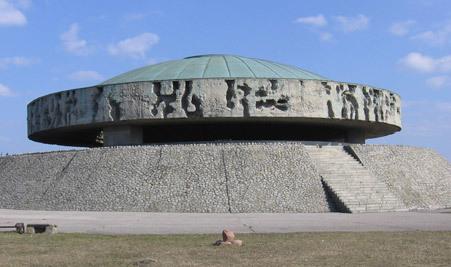On ownership – Anshel Peffer in Haaretz:
‘We worry about Holocaust denial, as we should. But at the same time, we fail to give credit to the countless researchers, historians, educators, writers and filmmakers, and above all, the survivors, who after rebuilding their lives, found it in themselves to share what they had experienced with others.
Thanks to them there is no real danger of the Holocaust ever being forgotten. The real challenge is not holding on to their memories: those are well-preserved, but to avoid the trivialization, politicization and manipulation of our collective Shoah memory.
(…)
What to do with an Israeli prime minister who can’t mention the Holocaust without dragging in Iran, and who excuses, for the sake of political convenience, his personal allies around the world of their own neo-Nazi dalliances and light Holocaust revision? Benjamin Netanyahu is no different in his use and abuse of memory from those who only bring up the Holocaust to make spurious comparisons between Israelis and Nazis.
We can’t police Holocaust discourse. We can’t even claim it as Jews for ourselves anymore, now that it’s become an "International" Memorial Day.
The date was fixed for the anniversary of the liberation of Auschwitz, and while Jews were, by overwhelming numbers, the majority of the victims of the Birkenau death camp built besides Auschwitz, and of the other death camps as well, there were other victims from every country in Europe, as well as other minority groups like the Roma and members of the LGBT community. Increasingly, the word “Jews” is absent from the statements of politicians and media features marking the date.
In some cases, it’s relatively easy to attribute this omission to conscious attempts to downplay any unique victimhood to the Jews. And it’s not new of course: The Soviet Union under Joseph Stalin brutally repressed its own Jewish citizens, not least when they tried to commemorate victims as Jews.
Denying their identity and rolling them all in to one group of "victims of fascism," was just one stage before the show-trials in Moscow and Prague and the accusations leveled at Jews that they were "Zionist-Nazi" agents of the west.
Similar motives exist today, whether on the Israel-hating hard left, who use the same Soviet tropes from the 1950s, or the right-wing nationalist governments of Poland and Hungary for whom the actual circumstances of the Holocaust in their countries, especially the collaboration of "patriotic" citizens in the deportation and murder of their Jewish neighbors, is an inconvenient blot on their reconstructed national narrative.
But there are also good faith actors who simply want to make the Holocaust more inclusive. And with good reason, since the mass-murder of the Roma under the Nazis certainly hasn’t received anywhere near sufficient recognition in either the history books or public memorials. And what would be more natural than for members of the LGBT community to want to commemorate their own suffering?
That inclusivity doesn’t have to detract from the planned and industrialized genocide of millions of Jews, which was of a different scale to that of other groups. But there are legitimate concerns about how the wider public could lose sight of the unique way in which the Nazis, from early on, sought the eradication of the Jews and then devoted considerable resources to it, even when it was a distraction from their wider war effort.’
(…)
‘Governments and international organizations can’t be trusted not to use memory, or ignore inconvenient parts of it for their own political considerations. It falls to individuals, especially to those of us who had the unique privilege to be born to parents and grandparents who survived, to use what voices we have to try and keep the record straight.’
Read the article here.
All official commemorations are political, that’s unavoidable. But trivialization and willfully manipulation of collective memories are not necessarily the same.
I happen to agree with Mr. Pfeffer, it’s up to individuals to keep the record straight, to take history seriously, but not treat it as something holy, to go back to the facts, to go back to the testimonies, to go back to the sources. History is never finished, especially not this history, but it should also not become a secular religion, that’s walking a tightrope. There’s no alternative.
